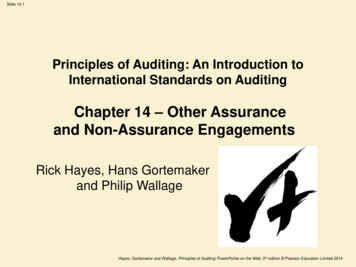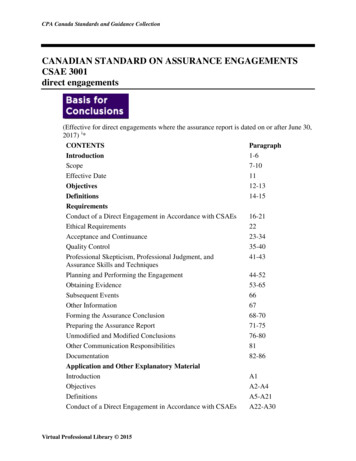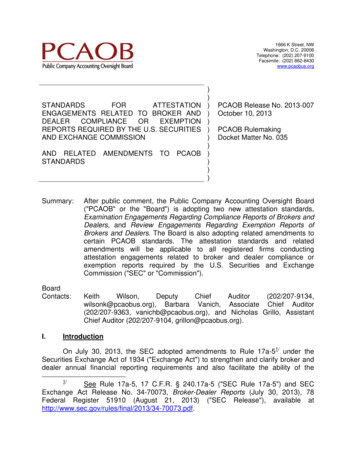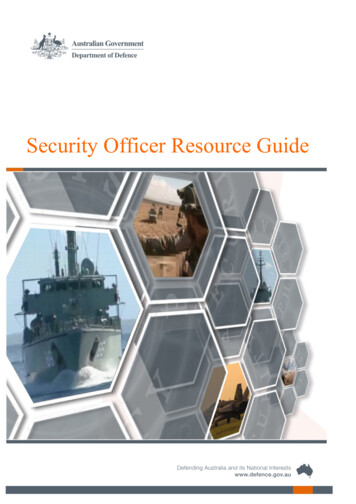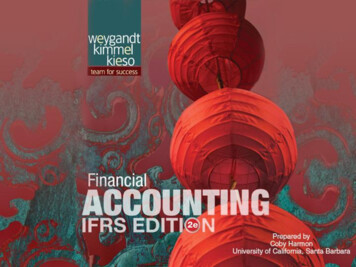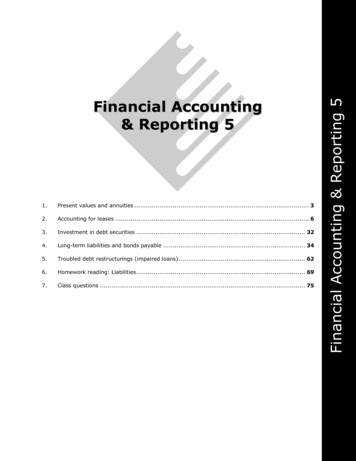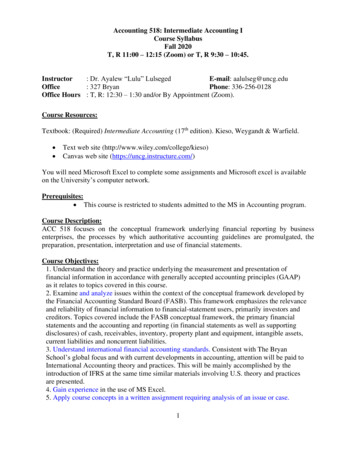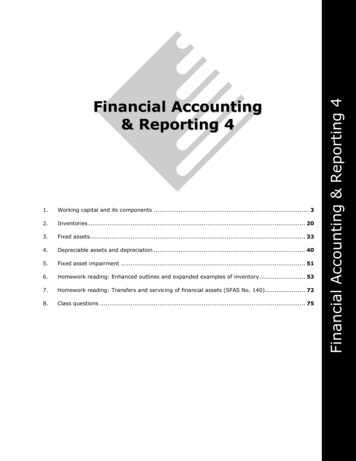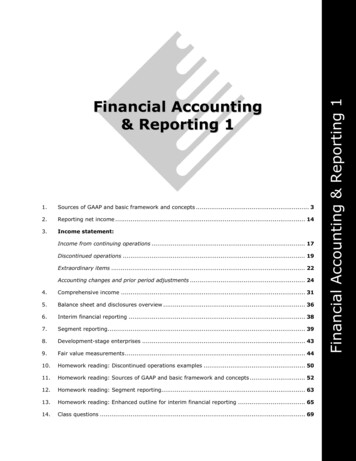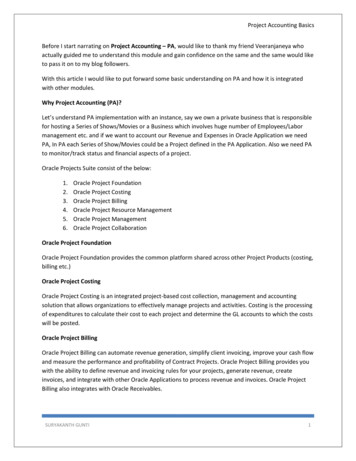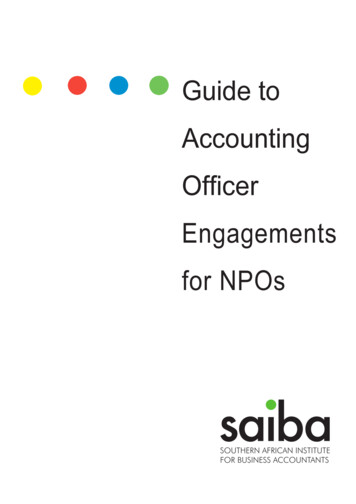
Transcription
Guide toAccountingOfficerEngagementsfor NPOsRESSION OF INTEREST
The Southern African Institute for Business Accountants NPC10 Centuria Park265 Von Willich AveCenturion0046For further information on this guide, please email technical@saiba.org.za. spublicationfrom:http://www.saiba.org.zaThe mission of SAIBA is to serve the public interest, strengthen the accountancyprofession in Southern Africa and contribute to the development of a strong regionaleconomy by establishing and promoting adherence to high-quality professional standards,furthering co-operation on such standards and speaking out on public interest issueswhere the profession’s expertise is most relevant. This will enable SAIBA to deliver trustedadvisors to Southern African NPOs.Publication copyright August 2015 by SAIBA. All rights reserved. Permission is grantedto make copies of this work provided that such copies are for use in academic classroomsor for personal use and are not sold or disseminated and provided that each copy bearsthe following credit line: “Publication copyright August 2015 by Southern African Institutefor Business Accountants (SAIBA). All rights reserved. Used with permission.” Otherwise,written permission from SAIBA is required to reproduce, store or transmit this document,except as permitted by law.SAIBA assumes no liability or guarantee whatsoever for damages of any type, includingand without limitation for direct, special, indirect, or consequential damages associatedwith the use of this publication. This publication does not constitute legal advice. Users ofthis document should obtain their own legal advice before applying the content of thisdocument.2
Preface . 5Request for comment . 6Introduction to Non-Profit Organisations . 7Registered Non-Profit Organisations (NPOs). 9Overview . 9Registration in terms of the NPO Act . 10Key obligations of registered NPOs . 11License to Practice . 15Engagement standards, ethics and quality control. 16Engagement framework for NPO accounting officer reports . 19Definition and objective of an accounting officer reporting engagement for NPOs . 20Scope of the framework . 20General principle of an accounting officer engagement for an NPO . 21Defining the terms of the engagement . 22Planning . 23Documentation . 23Procedures and evidence . 23Conclusions and reporting . 253
Appendix 1 . 274
PrefaceThis SAIBA Guide to Accounting Officer Engagements for NPOs (the Guide), wascommissioned by the SAIBA Small and Medium Practices (SMP) Committee to provideguidance to Business Accountants in Practice (SA) or BAP(SA) on how to perform anaccounting officer engagement for a non-profit organisation (NPO).SAIBA would like to acknowledge specific contributors to the guide. Ricardo Wyngaardfrom Ricardo Wyngaard Attorneys (www.nonprofitlawyer.co.za) and Nicolaas van Wyk,BAP(SA), CEO of SAIBA.The Guide provides BAP(SA)s with a broad understanding of the NPO Act whilst focusingon the specific obligations of the accounting officer. As such the Guide will help BAP(SA)soperate with greater compliance and professionalism and in a so doing help them cope inan increasingly complex and competitive environment.Professor Dovhani ThakhathiChairpersonSAIBAAugust 20155
Request for commentThis is the first version of the Guide. We consider the Guide to be of high quality anduseful in its present form, but like any first edition, it can be improved. Hence, we arecommitted to updating the Guide on a regular basis to ensure it reflects current bestpractice and is as functional as possible.The next update is scheduled for 2016. We welcome comments from members and otherstakeholders. These comments will be used to assess the Guide’s usefulness and toimprove it prior to publishing the second edition.Please submit your comments totechnical@saiba.org.za6
Introduction to Non-ProfitOrganisations1.Non-profit organisations in South Africa can essentially be established through threeforms of legal entities, namely: voluntary associations, non-profit trusts, and nonprofit companies.Voluntary AssociationsA voluntary association is in essence an agreement between three or more peopleto achieve a common object, which cannot be the making of profits. It is a popularamongst smaller and informal community-based initiatives.It is regulated bycommon law and not statute. Voluntary associations are not required to register witha public office in order for it to exist. The voluntary association must meet threerequirements in order to have legal personality, namely: Have perpetual succession, Be able to hold property distinct from its members, and Stipulate that no member has any rights by reason of his membership tothe property of the voluntary association.Non-profit TrustsA trust is established in terms of the Trust Property Control Act, of 1988. In essence,a trust is established when ownership of property is transferred (by writtenagreement, testamentary writing, or court order) to another party, to be administeredfor the benefit of certain persons or the achievement of a particular goal. The Masterof the High Court oversees the appointment of trustees and polices the properperformance of the trustees’ duties with respect to the trust property. The TrustProperty Control Act requires that the first trustees must lodge the trust deed withthe Master of the High Court. Trustees can only act in their capacity as trustees afterhaving been authorised in writing by the Master.7
Non-profit CompaniesThe Companies Act, No. 71 of 2008 was signed into law during April 2009 and cameinto operation on 01 May 2011 and replaces the Companies Act of 1973. TheCompanies Act recognises the non-profit company (NPC) as a separate category ofcompany that must have a minimum of 3 directors and that can be established withor without members. The NPC can be incorporated for a public benefit object or anobject relating to one or more cultural or social activities, or communal or groupinterests. The NPC is registered with the Companies Commission.8
Registered Non-ProfitOrganisations (NPOs)Overview2.The Nonprofit Organisations Act (the NPO Act) provides for a voluntary registrationfacility for non-profit organisations. Section 2 of the NPO Act lists its objects as beingto encourage and support NPOs in their contribution to meeting the diverse needs ofthe population of the Republic of South Africa.3.The NPO Act defines a non-profit organisation, as a trust, company or otherassociation of persons established for a public purpose and the income and propertyof which are not distributable to its members or office-bearers except as reasonablecompensation for services rendered.4.The NPO Act defines a registered non-profit organisation as a non-profitorganisation registered in terms of section 13 of the NPO Act. Only nonprofitorganisations, as defined in the NPO Act, can apply for registration in terms of theNPO Act.5.In pursuing this broad objective, the NPO Act lists five specific objectives. Probablythe most important being the creation of an enabling environment in which NPOscan flourish. The others are: Establishing an administrative and regulatory framework within which nonprofitorganisations can conduct their affairs; Encouraging nonprofit organisations to maintain adequate standards ofgovernance, transparency and accountability and to improve those standards; Creating an environment within which the public may have access to9
information concerning registered nonprofit organisations; and Promoting a spirit of co-operation and shared responsibility within government,donors and amongst other interested persons in their dealings with nonprofitorganisations.6.The NPO Act is made up of five chapters. Two substantive chapters are dealing withthe creation of an enabling environment and the registration of NPOs under the NPOAct. Chapter 2 of the NPO Act is entitled Creation of an Enabling Environment whilstChapter 3 is entitled Registration of Nonprofit Organisations.Registration in terms of the NPO Act7.Section 12 of the NPO Act lays down a number of prescribed conditions that mustbe complied with in order for a non-profit organisation to be eligible for registration interms of the NPO Act. Its founding document (or the law in terms of which it hasbeen established) must cover the required clauses captured in section 12 of theNPO Act.8.A prescribed application form must be completed when application is made forregistration in terms of the Non-profit Organisations Act. A registered nonprofitorganisation is issued with a certificate of registration, which is sufficient proof thatthe organisation is registered in terms of the NPO Act and is a body corporate.9.Section 16(1)(c) of the NPO Act provides that the certificate of registration of a NPO,or a duly certified copy of the certificate, is sufficient proof that the registered NPO isa body corporate (except for non-profit trusts).10.A registered NPO is required to reflect its registered status and registration numberon all of its documents.10
Key obligations of registered NPOsAccounting Records and Financial Statements11.The NPO Act requires that all registered NPOs must, to the standards of generallyaccepted accounting practice: Keep, accounting records of its income, expenditure, assets and liabilities. Thiswill include all cash and credit transactions. Draw up financial statements within six (6) months of its financial year-end,which must include an income, and expenditure statement, and a balancesheet reflecting its assets and liabilities.12.Every NPO must preserve each of its books of account, supporting vouchers, recordsof subscriptions or levies paid by its members, income and expenditure statements,balance sheets and accounting officer’s reports, in an original or reproduced form.13.The NPO Act does not define the meaning of generally accepted accounting practice(gaap). However it is commonly understood to mean that financial statements must bedrawn up to what is common within a particular industry or sector. Generally NPOsprepare financial statements using the following conventions: International Financial Reporting Standards (IFRS), International Financial Reporting Standards for Small and Medium Enterprises(IFRS for SMEs), Modified cash basis of accounting or other basis suitable to the activities andnature of the NPO.14.An NPO should select a reporting convention by considering the following: Any legislative requirements applicable to the NPO, The specifications from donors or government grants, The nature and scope of the activities of the NPO.Accounting officer’s report15.The NPO Act requires that all registered NPOs appoint an accounting officer to holdoffice. Chapter 1 of the NPO Act defines an accounting officer, in relation to anonprofit organisation, as a person contemplated in section 60 of the Close11
Corporations Act, 1984.16.Section 60 of the Close Corporations Act empowers the Minister of the Department ofTrade and Industry to issue a notice appointing professional bodies whose membersmay act as accounting officers. SAIBA has been appointed as controlling body foraccounting officers since 1987. Only those SAIBA members with the designationBAP(SA) are recognized as accounting officers.17.The accounting officer has a duty in terms of the NPO Act to compile a written reportwithin eight (8) months of the organisation’s financial year-end. The accountingofficer’s report must be submitted to the NPO and state whether the: Financial statements of the organisation are consistent with its accountingrecords, Accounting policies of the organisation are appropriate and have beenappropriately applied in the preparation of the financial statements, and the NPO has complied with the provisions of the NPO Act and of its constitution,which relate to financial matters.18.The accounting officer also has a reporting duty to the NPO Directorate. If theaccounting officer of a NPO becomes aware of any instance in which the NPO hasfailed to comply with the financial provisions of the NPO Act or its constitution, theaccounting officer must notify the NPO Directorate of this non-compliance. The noticemust be sent within one (1) month after becoming aware of the failure and must be inwriting with sufficient detail to describe the nature of the non-compliance.19.The duty to report to the NPO Directorate supersedes the duty of confidentiality owedt
accounting officer engagement for a non-profit organisation (NPO). SAIBA would like to acknowledge specific contributors to the guide. Ricardo Wyngaard from Ricardo Wyngaard Attorneys (www.nonprofitlawyer.co.za) and Nicolaas van Wyk, BAP(SA), CEO of SAIBA. The Guide provides BAP(SA)s with a broad understanding of the NPO Act whilst focusing on the specific obligations of the accounting
